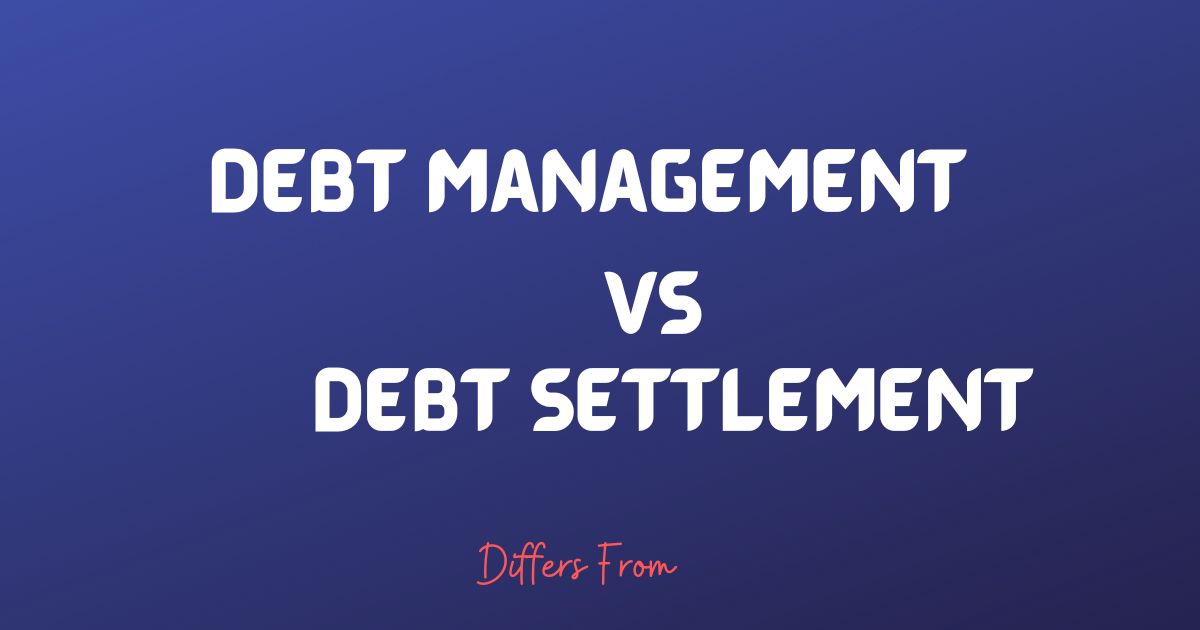Debt management and debt settlement are two different approaches to resolving outstanding debts. Debt Management involves regular payments to creditors over time to pay off the entire debt. Debt Settlement consists in negotiating with creditors to reduce the total amount owed. Both approaches can help reduce the burden of debt and get individuals out of debt promptly. However, the chosen process depends on a person’s financial situation, ability to repay debtors and the type of debt owed. In this blog, we will discuss in detail the difference between debt management and debt settlement with comparison in a table.
Definition of Debt Management
Debt management is managing and organizing your debts to pay them off promptly and efficiently. It involves creating a budget, negotiating with creditors, and making timely payments. Debt management can help you avoid bankruptcy, reduce interest rates, and get out of debt faster.
How Debt Management Works
Debt management works by creating a budget that considers your income and expenses. You then use this budget to determine how much you can afford to pay towards your debt each month. Once you have chosen your budget, you can contact your creditors to negotiate a lower interest rate or a payment plan that works for both parties. Once you have agreed on a payment plan, you must make payments on time to avoid late fees and other penalties.
Pros of Debt Management:
1. Helps to reduce debt by negotiating lower interest rates and monthly payments with creditors.
2. Can help to avoid bankruptcy and other legal actions taken by creditors.
3. Can help to improve credit score by making timely payments.
4. Can help to reduce stress and anxiety associated with debt.
Cons of Debt Management:
1. It May require closing credit cards and other accounts, which can hurt credit scores.
2. It May require paying additional fees to debt management companies.
3. It Can take a long time to pay off debt, depending on the amount owed.
4. It Can harm the ability to obtain new credit or loans.
Definition of debt settlement
Debt settlement is negotiating with creditors to settle a debt for less than the total amount owed. The process involves the debtor making a lump sum payment to the creditor in exchange for a reduced balance. The creditor agrees to accept the reduced amount as payment in full. The debtor is no longer responsible for the remaining balance. The process can be used to settle credit card debt, medical bills, and other types of debt.
How debt settlement works
To begin the debt settlement process, the debtor must contact the creditor and explain their financial situation. The debtor should provide evidence of their financial hardship and explain why they cannot pay the total amount owed. The creditor may then agree to accept a reduced amount as payment in full.
Pros of debt settlement
1. Reduced debt amount: Debt settlement can reduce the total debt owed, allowing for a more manageable repayment plan.
2. Faster repayment: Debt settlement can help you pay off your debt faster than other methods, such as debt consolidation.
3. Lower interest rates: Debt settlement can often result in lower interest rates, saving you money in the long run.
4. Improved credit score: Settling your debt can improve your credit score over time, as long as you make your payments on time.
Cons of debt settlement
1. Fees: Debt settlement companies often charge high fees for their services, which can add to your overall debt burden.
2. Damage to credit score: Debt settlement can hurt your credit score in the short term, as it will appear on your credit report as a negative item.
3. Tax implications: Depending on the amount of debt forgiven, you may be required to pay taxes on the discounted amount.
4. Creditor refusal: Creditors may refuse to negotiate or accept a settlement offer, leaving you with no other option than to pay the total amount owed.
Debt Management vs Debt Settlement: What’s the Difference?
| Debt Management | Debt Settlement | |
| Definition | A plan to repay debt over a longer period of time, often with reduced interest rates | A process of negotiating with creditors to pay off a portion of the debt, often at a reduced amount |
| How it works | A credit counseling agency works with the borrower and creditors to create a repayment plan | A debt settlement company or attorney negotiates with creditors on the borrower’s behalf to settle the debt for less than the full amount owed |
| Pros | Reduced interest rates can lower monthly payments | Can result in paying off debt for less than the full amount owed |
| Cons | May take longer to pay off debt | Can have a negative impact on credit score and may not be successful in settling all debts |
| Best for | Individuals who can afford the reduced but longer payments, and who want to avoid bankruptcy | Individuals who are unable to afford their current payments and are willing to accept the negative impact on their credit score in exchange for settling their debt for less. |
Debt Management vs Debt Settlement: Similarities
The main similarity between debt management and debt settlement is that both strategies can help you get out of debt. Both approaches involve negotiating with creditors to reduce the money you owe. Both can help you become debt-free in a shorter amount of time.
Key difference between Debt Management and Debt Settlement
The main difference between debt management and debt settlement is how the debt is reduced. With debt management, you make regular payments to a credit counselling agency, which then distributes the payments to your creditors. The credit counselling agency can negotiate a lower interest rate or waive specific fees. With debt settlement, on the other hand, you make a lump sum payment to a debt settlement company, which then negotiates with your creditors to reduce the amount of money you owe.
Debt Management vs Debt Settlement: which option is more appropriate for you?
The answer will depend on your situation.
Debt management may be a better option for individuals who can afford the reduced but more extended payments and want to avoid bankruptcy. On the other hand, debt settlement may be more appropriate for individuals who cannot afford their current fees and are willing to accept the negative impact on their credit score in exchange for settling their debt for less.
Situations where one may be more appropriate than the other
Debt management may be more appropriate if you have a steady income and can make regular payments. It’s also a good option if you want to avoid damaging your credit score. If you have a large debt, Debt settlement may be more appropriate. And again, if you can’t make regular payments or are willing to accept a lower credit score in exchange for a lower debt amount, it could be the best for you.
Ultimately, the best way to decide which approach is right for you is to speak with a financial advisor who can help you evaluate your situation and determine the best course of action.
Tips for Effective Debt Management
1. Create a budget: Creating a budget is the first step in effective debt management. Make sure to include all your income and expenses to accurately determine how much you can afford to pay towards your debt each month.
2. Negotiate with creditors: Negotiating with creditors can help you get a lower interest rate or a more manageable payment plan. Be sure to research before negotiating to know what kind of deal you can get.
3. Make payments on time: Paying on time is essential for successful debt management. Set up automatic payments if possible, so you don’t forget to make a payment.
4. Track your progress: Tracking your progress can help you stay motivated and on track with your debt repayment plan. Set up reminders or use an app to help you stay organized and on top of your payments.
5. Seek help if needed: If you are having trouble managing your debt, don’t be afraid to seek help from a financial advisor or credit counselling service. They can provide valuable advice and assistance in getting out of debt.
Can I negotiate a credit card debt settlement myself?
Debt settlement on your own can be done, but it’s not without its own challenges, risks, and potential consequences to your credit. To make matters worse, being delinquent on your payments is a prerequisite for debt settlement, and this will remain on your credit report for seven years. Talking to a non-profit consumer credit counseling agency is a good first step if you’re having trouble keeping up with your payments.
How do I negotiate with debt collectors for a lower settlement?
If you have fallen more than 90 days behind on your debt payments, you may be able to negotiate a settlement with your creditors. Explain to the creditor why you’ve fallen behind on your payments and propose a settlement amount that you’re confident you’ll be able to pay, such as half of the original debt.
Some creditors will insist on being paid in one large sum, while others may be willing to work out a payment plan. You’ll have more bargaining power if you’ve set aside some money in advance.
How can I find a credit counseling agency to get help and sign up for a debt management program?
The National Foundation for Credit Counseling (NFCC) and the Financial Counseling Association of America (FCAA) can help you locate credit counseling agencies and certified credit counselors (FCAA).
Conclusion
Debt management and debt settlement are both options that can help individuals become debt-free. However, they work differently and may be more appropriate for different situations. It is essential to carefully consider your situation and speak with a financial professional before deciding. Always weigh the pros and cons before taking any steps to manage your debt, and keep in mind the long-term ramifications of your decisions. It is always advisable to consider the best option that suits your financial condition and credit score.

